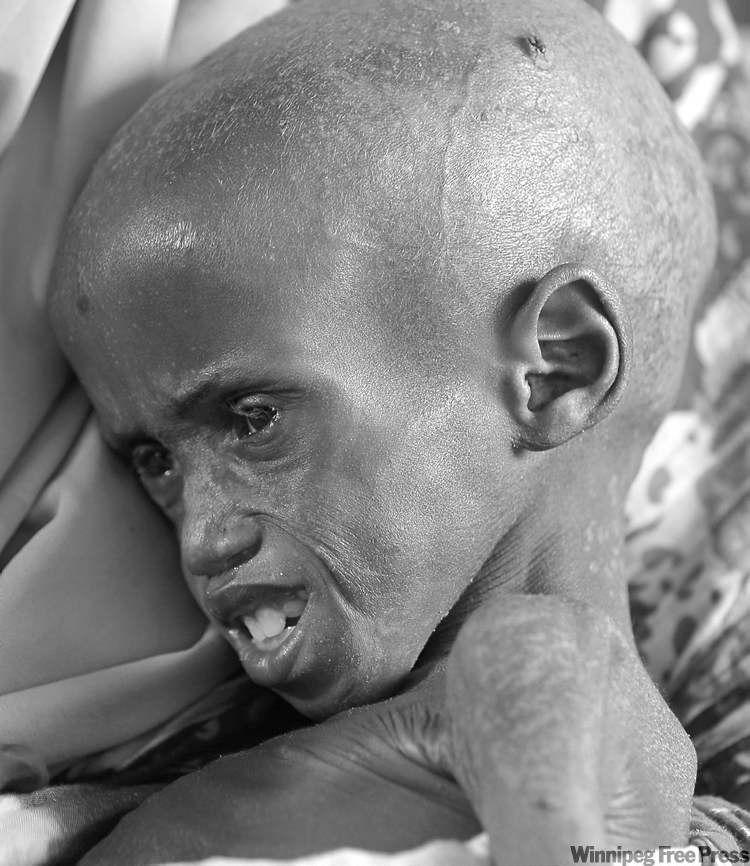UN plans airlift operation to feed starving Somalis
Advertisement
Read this article for free:
or
Already have an account? Log in here »
To continue reading, please subscribe:
Monthly Digital Subscription
$1 per week for 24 weeks*
- Enjoy unlimited reading on winnipegfreepress.com
- Read the E-Edition, our digital replica newspaper
- Access News Break, our award-winning app
- Play interactive puzzles
*Billed as $4.00 plus GST every four weeks. After 24 weeks, price increases to the regular rate of $19.00 plus GST every four weeks. Offer available to new and qualified returning subscribers only. Cancel any time.
Monthly Digital Subscription
$4.75/week*
- Enjoy unlimited reading on winnipegfreepress.com
- Read the E-Edition, our digital replica newspaper
- Access News Break, our award-winning app
- Play interactive puzzles
*Billed as $19 plus GST every four weeks. Cancel any time.
To continue reading, please subscribe:
Add Winnipeg Free Press access to your Brandon Sun subscription for only
$1 for the first 4 weeks*
*$1 will be added to your next bill. After your 4 weeks access is complete your rate will increase by $0.00 a X percent off the regular rate.
Read unlimited articles for free today:
or
Already have an account? Log in here »
Hey there, time traveller!
This article was published 26/07/2011 (5161 days ago), so information in it may no longer be current.
DOLO, Somalia — The UN will airlift emergency rations this week to parts of drought-ravaged Somalia that militants banned it from more than two years ago — a crisis intervention to keep refugees from dying along what an official calls the “roads of death.”
The foray into the famine zone is a desperate attempt to reach at least 175,000 of the 2.2 million Somalis whom aid workers have not yet been able to help.
Tens of thousands already have trekked to neighbouring Kenya and Ethiopia, hoping to get aid in refugee camps.

Some — such as Isaac Bulle and his family — have nearly nothing left.
“I hope we can cross to Ethiopia, but if we can get help here, we will stay here,” said Bulle, who travelled with his two wives and 14 children for 25 days by donkey cart to reach this border town.
“Our aim is just to get food. Not to leave the country.”
Restarting the aid effort is a huge challenge for the World Food Program, whose workers were previously banned from the region by the al-Qaida-linked militant group al-Shabab. Fourteen WFP employees have been killed in Somalia since 2008. New land mines have severed a key road to Dolo. A landing strip has fallen into disrepair. Old employees must be found and rehired.
The new feeding efforts in the four districts of southern Somalia near the border with Kenya and Ethiopia could begin by Thursday, slowing the flow of tens of thousands of people who have fled their homes in hope of reaching aid.
The Bulle family is parked under the thorny branches of an acacia tree one river crossing from refugee camps in the Ethiopian town of Dollo Ado. They sleep on two tiny straw mats, although the youngest are bedding down on the rocky sand.
Bulle once had 50 cattle, some goats and grew sorghum. But the rains stopped two years ago and food supplies stored in a cellar lasted the family a year. Then the animals began to die, forcing him to pack up.
When asked how much money he had, Bulle pulls out a thick wad of Somali shillings — bills that add up to the equivalent of only 80 cents. His only sign of wealth is a wristwatch.
His family survived the journey with no one getting hurt, killed or left behind.
UN worker Abdi Nur said although Bulle was “clever” to pack just enough food to make it, he pointed to the farmer’s young children gathered under the acacia tree.
“The kids are getting thinner. You can see,” Nur said. “They are getting malnourished.”
Nearby, hundreds of women with small children lined up over the weekend to register for the food distribution.
At a separate, less-organized site in the centre of Dolo, a scrum of crying children and women in bright scarves pushed, pulled and shoved to register for this week’s food distribution.
Dolo is the kind of sleepy African town where little children don’t wear pants. Craggy sticks form fences between mud huts. Although a wide, muddy river flows here, the rocky and sandy soil supports little vegetation.
The UN says two regions of Somalia are suffering from famine and that 11 million people are in need of aid. But as of Aug. 1, the UN is set to declare all of southern Somalia — including Dolo — a famine zone.
In Rome, the UN Food and Agriculture Organization said a co-ordination conference would be held Wednesday in Kenya. The UN is pressing its efforts to gather $1.6 billion in aid in the next 12 months, with $300 million of that coming in the next three months.
— The Associated Press




